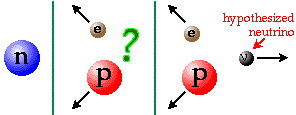![]() Neutrinos are
produced in a variety of decays and interactions.
For example, a neutron decays into a proton,
an electron, and an anti-neutrino.
In fact, it was through
careful observation of radioactive decays that
physicists hypothesized the neutrino's existence.
Neutrinos are
produced in a variety of decays and interactions.
For example, a neutron decays into a proton,
an electron, and an anti-neutrino.
In fact, it was through
careful observation of radioactive decays that
physicists hypothesized the neutrino's existence.
![]() For example,
when a neutron decays into an electron and proton,
the sum of the electron's and the proton's momenta is not
equal to the original momentum of the neutron.
Thus, there must be some other particle
involved in this decay that accounts for the missing momentum: the neutrino.
For example,
when a neutron decays into an electron and proton,
the sum of the electron's and the proton's momenta is not
equal to the original momentum of the neutron.
Thus, there must be some other particle
involved in this decay that accounts for the missing momentum: the neutrino.

Use your browser's "back" button or
go back to the
![]() Standard Model Path.
Standard Model Path.